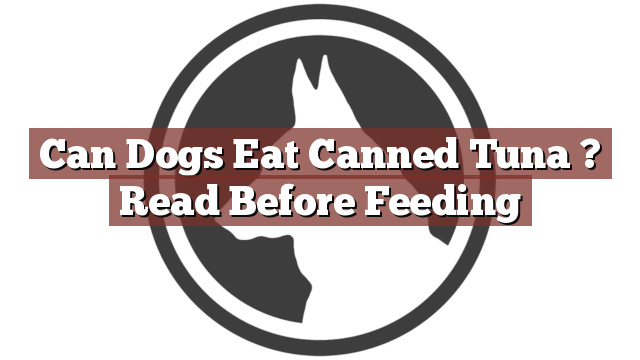Understanding Your Dog’s Dietary Needs
As a dog owner, it is essential to understand your furry friend’s dietary needs. Dogs require a balanced diet that consists of protein, carbohydrates, fats, vitamins, and minerals. While it may be tempting to share your favorite foods with your canine companion, it is crucial to be cautious about what you feed them. Some human foods can be harmful or even toxic to dogs. Therefore, it is always wise to consult with a veterinarian before introducing any new food into your dog’s diet.
Can Dogs Eat Canned Tuna? Read Before Feeding
Can dogs eat canned tuna? This is a common question among pet owners who are looking to provide their dogs with a variety of food options. The answer is yes, dogs can eat canned tuna, but with a few considerations. Tuna is a good source of protein and contains omega-3 fatty acids, which are beneficial for a dog’s overall health. However, it is important to feed them canned tuna in moderation and take certain precautions.
Pros and Cons of Feeding Canned Tuna to Your Dog
Feeding your dog canned tuna has its advantages and disadvantages. The pros include the high protein content, omega-3 fatty acids, and the fact that it can be a valuable alternative protein source for dogs with specific dietary restrictions or allergies. Canned tuna can also be a convenient option when traveling or in emergency situations.
However, the cons should not be overlooked. Canned tuna is often packed in oil or brine, which can be high in sodium and may cause digestive issues or lead to dehydration in dogs. Additionally, some canned tuna varieties may contain added spices or flavorings that can be harmful to dogs. Furthermore, tuna is a predatory fish that can accumulate mercury and other environmental contaminants, which can be detrimental to a dog’s health if consumed regularly and in large quantities.
In Conclusion: Weighing the Benefits and Risks of Canine Tuna Consumption
In conclusion, while dogs can eat canned tuna, it is crucial to do so in moderation and with caution. Before incorporating canned tuna into your dog’s diet, consult with a veterinarian to ensure it is suitable for your dog’s specific needs and health condition. If you decide to feed your dog canned tuna, opt for varieties that are packed in water rather than oil or brine, as this reduces the sodium content. Also, be mindful of any added spices or flavorings that may be harmful to your dog. Lastly, rotate their diet and offer a variety of other protein sources to ensure a well-rounded and balanced meal plan for your furry friend. Remember, the key to a healthy dog is a balanced and appropriate diet tailored to their individual needs.
Thank you for taking the time to read through our exploration of [page_title]. As every dog lover knows, our furry friends have unique dietary needs and responses, often varying from one canine to another. This is why it's paramount to approach any changes in their diet with caution and knowledge.
Before introducing any new treats or making alterations to your dog's diet based on our insights, it's crucial to consult with a veterinarian about [page_title]. Their expertise ensures that the choices you make are well-suited to your particular pet's health and well-being.
Even seemingly harmless foods can sometimes lead to allergic reactions or digestive issues, which is why monitoring your dog after introducing any new food item is essential.
The content provided here on [page_title] is crafted with care, thorough research, and a genuine love for dogs. Nevertheless, it serves as a general guideline and should not be considered a substitute for professional veterinary advice.
Always prioritize the expert insights of your veterinarian, and remember that the health and happiness of your furry companion come first.
May your journey with your pet continue to be filled with joy, love, and safe culinary adventures. Happy reading, and even happier snacking for your canine friend!

